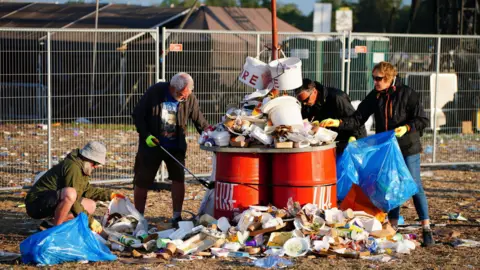Why there will be no Glastonbury Festival in 2026
 EPA
EPABe prepared to make the most of Glastonbury Festival this year, as organisers say it will be taking a break in 2026.
The festival will take a fallow year - a planned respite where the event does not take place, allowing the farmland to recover and the natural environment to regenerate.
The music festival takes a hiatus every five years to avoid causing irreparable damage to the working pastures of Worthy Farm.
Co-organiser Emily Eavis said: "The fallow year is important because it gives the land a rest, it gives the cows a chance to be out for longer and reclaim their land."
 PA Media
PA MediaThe concept originates from agricultural practices, where land is left unplanted to improve soil quality and allow it to replenish its nutrients for cattle grazing.
The festival's last official fallow year was in 2018, but organisers had to cancel two consecutive years in 2020 and 2021 due to the pandemic.
Co-organiser Emily Eavis told the BBC we are once again "due a fallow year".
"Sustainability and the need to live in harmony with the land has always been vital to Glastonbury Festival," she said.
"And I think it's important because it just gives everybody a little time to just switch off".
The fallow year also offers a break for the community in Pilton, where the festival is held.
 Getty Images
Getty ImagesOrganisers have implemented a series of initiatives to reduce the waste left on-site.
This includes a 'love the farm, leave no trace' pledge, which festival-goers are asked to sign up to after purchasing a Glastonbury ticket.
Single-use plastic plates, cups, mugs and cutlery have been banned on site, alongside glass bottles, flares and Chinese lanterns.
In a statement, co-organiser Michael Eavis stated: "We are striving to leave as little an imprint on the land here as we possibly can.
"For me, Worthy Farm is what life here is all about."
Follow BBC Somerset on Facebook and X. Send your story ideas to us on email or via WhatsApp on 0800 313 4630.
